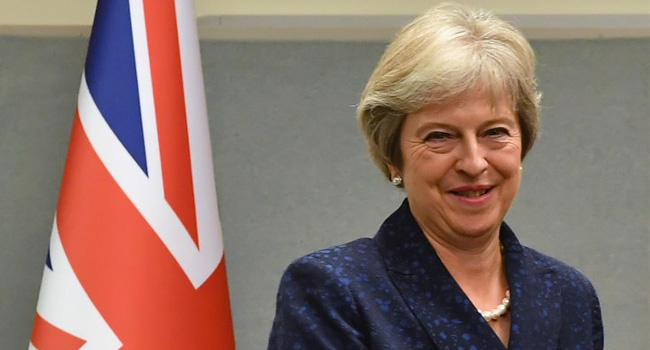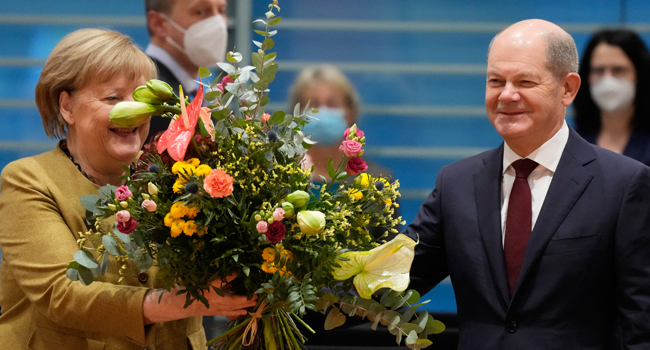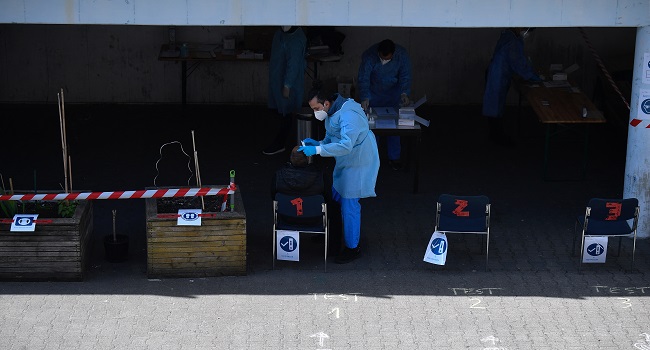
British Prime Minister Theresa May embarked Monday on a last-minute flurry of diplomacy that will include visits to Paris and Berlin as she prepares for a make-or-break EU summit.
Still struggling to get her EU divorce deal through parliament, May is hoping European Union leaders will agree on Wednesday to delay Brexit for a second time to stop Britain crashing out of the bloc two days later.
After putting her request in a letter to European Council president Donald Tusk last week, she had phone calls on Monday with him and European Commission chief Jean-Claude Juncker.
READ ALSO: US Homeland Security Chief, Kirstjen Nielsen Resigns
May also announced plans to visit German Chancellor Angela Merkel and French President Emmanuel Macron on Tuesday.
“She believes it’s important that she can set out the rationale for that ask as widely as possible in the lead-up to the European Council,” May’s spokeswoman said.
Faced with a months-long political deadlock in London, the EU agreed last month to delay Brexit from March 29 to April 12, and May now wants it pushed again to June 30.
But all the other 27 EU leaders must agree.
And while Tusk has suggested a year delay that could be cut short if May gets her deal agreed, Macron has warned he does not want to simply prolong the chaos in London.
Brussels struck a withdrawal agreement with May in November but British MPs have rejected it three times, with her own Conservative Party colleagues leading the opposition.
Desperate to deliver on the 2016 public vote to leave the EU and avoid the potentially disastrous prospect of a “no deal” exit, May last week approached the opposition Labour Party.
Their talks have so far failed to find a compromise solution, but more were planned at an official level on Monday evening.
Sincere cooperation
In Dublin, Irish Prime Minister Leo Varadkar expressed optimism about the cross-party process as he met with the EU’s chief Brexit negotiator, Michel Barnier.
“We’re open to extending the deadline to allow these discussions to run their course,” he said.
But Dutch Prime Minister Mark Rutte, who also spoke to May on Monday, said it was “crucial to know when and on what basis the UK will ratify the withdrawal agreement”.
He tweeted that any Brexit delay would require “assurances from the UK on sincere cooperation”.
May used that phrase in her letter to Tusk, saying Britain would continue to act as a “constructive and responsible” member state while it remained part of the bloc.
Red lines
Expectations are low for a deal with Labour as it wants a new customs union with the EU, something May has previously rejected as it would stop Britain striking its own global trade deals.
Labour leader Jeremy Corbyn last week said he was “waiting to see the red lines move”.
May is also under intense pressure from her own Conservatives not to compromise.
Former foreign minister Boris Johnson, a leading Brexiteer tipped to replace May, said it was “utterly incredible” that they were discussing a compromise plan.
But in a video message on Sunday, May stressed the important thing was Brexit, saying: “The longer this takes, the greater the risk of the UK never leaving at all.”
Some in the Labour Party would be happy with this — 80 MPs have written to Corbyn urging him to secure a guarantee of a second referendum in any deal with May.
Pro-Europeans are hoping that if a second referendum were held, voters might choose to reverse the whole Brexit process.
Labour is pressing for changes to a political declaration on Britain’s future relationship with the EU, which accompanies the withdrawal deal.
In Dublin on Monday, Barnier repeated that this could be reworked “extremely quickly”.
By contrast, the EU has vowed not to reopen the withdrawal agreement itself, which includes plans to keep open Britain’s border with Ireland that many of May’s lawmakers reject.
Barnier repeated that, in case of a no-deal Brexit, the EU would not open trade talks until the Irish issue was resolved.
“We would not discuss anything with the UK until there is an agreement for Ireland and Northern Ireland, as well as citizens’ rights and the financial settlement,” he said.
AFP



